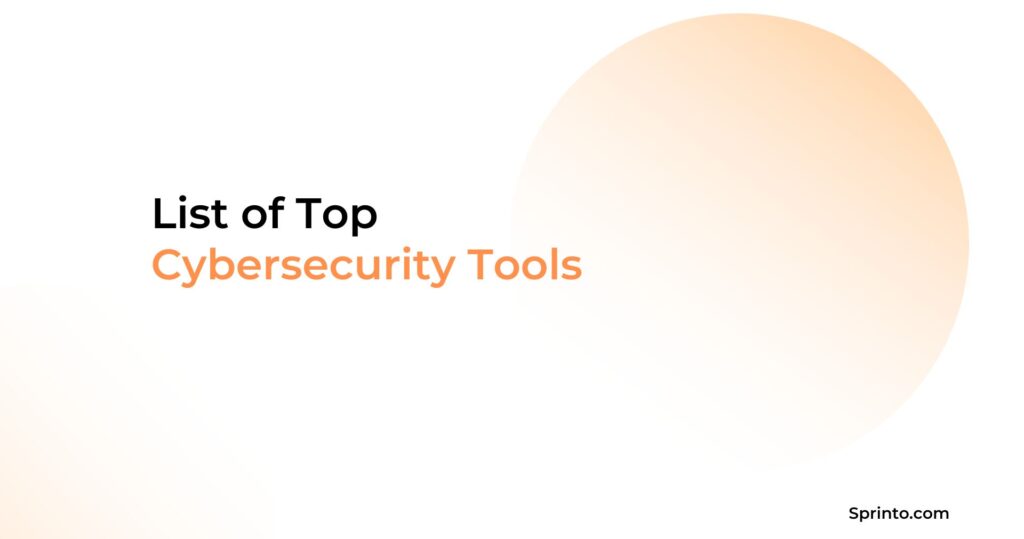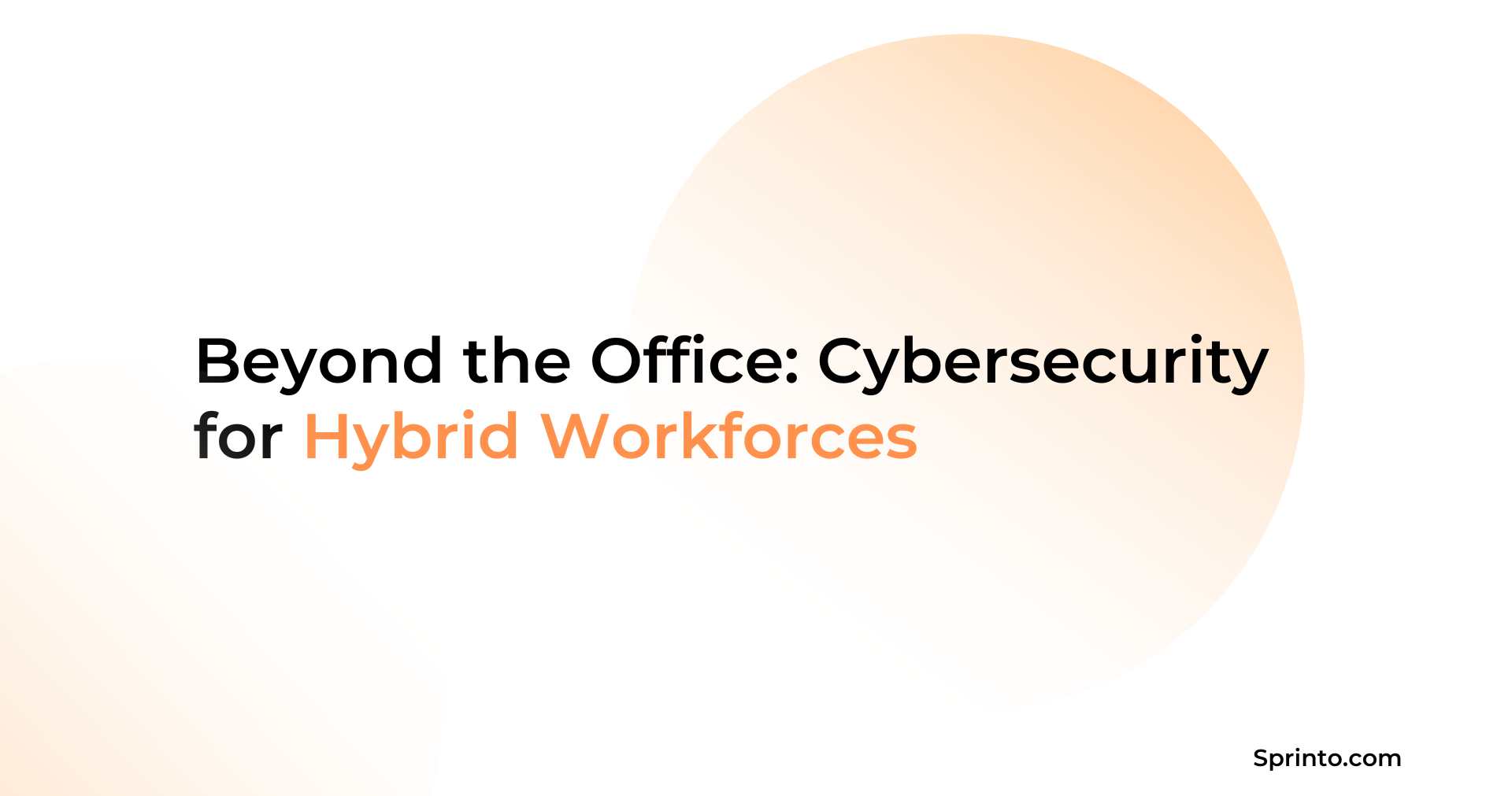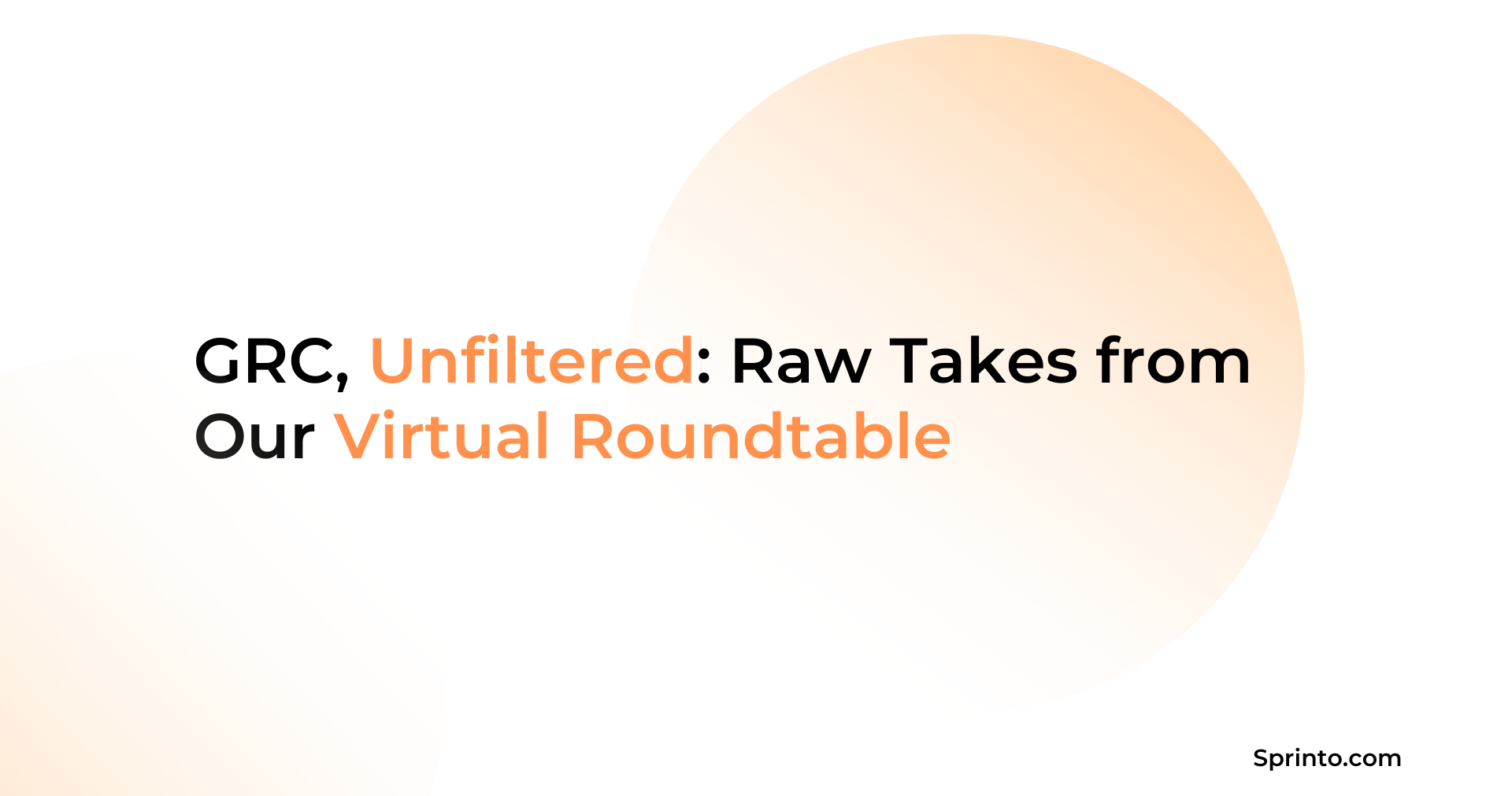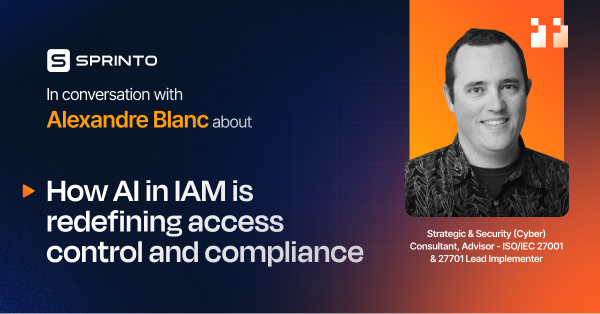11 Best Cyber Security Companies: How to Choose
Meeba Gracy
Oct 31, 2024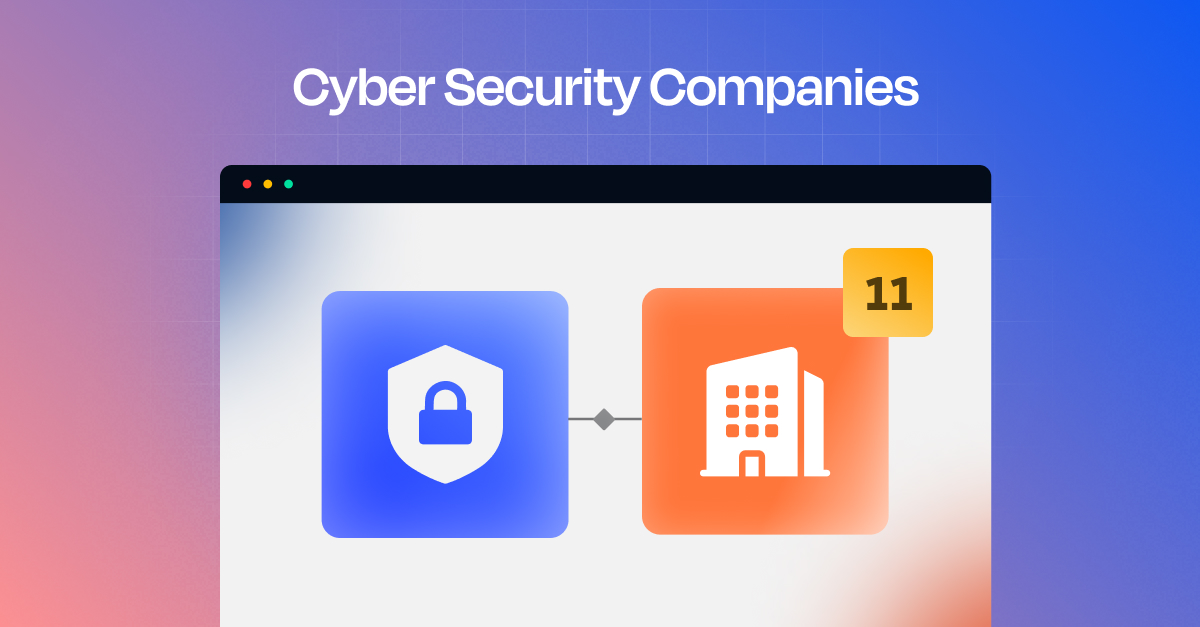
The cybersecurity industry is vast and varied, with companies specializing in everything from endpoint protection to compliance automation.
But with a seemingly endless list of cyber security companies vying for attention, each offering a unique mix of tools and services, choosing the right one can feel like searching for a needle in a haystack.
In this guide, we’ve curated a list of the 11 best cyber security services companies, highlighting what makes each stand out and offering tips to help you make an informed decision in a crowded market. Let’s dive in.
TL;DR
| The top 11 cybersecurity companies are Palo Alto Networks, Fortinet, CISCO, Crowdstrike, Zscaler, Sprinto, Darktrace, Trend Micro, Proofpoint, Okta, and Red Canary. |
| To choose a cyber security company, consider your internal risks and what kind of solution you might need. |
| Based on the top features across the companies, look for AI-driven threat detection and rapid response to address risks before they cause harm. |
Overview of the Top 11 Cybersecurity Companies
In this overview, we’ll dive into the top 11 cybersecurity companies discussed in detail above that are leading the charge in protecting organizations worldwide.
| Company | Core Focus | Features | G2 Rating |
| Palo Alto Networks | Advanced firewall & cloud security solutions. | – Threat prevention – Zero Trust – Code-to-cloud security – AI-driven threat prevention | 4.5/5 |
| Fortinet | Network security & threat intelligence. | – AI-powered monitoring – FortiGuard threat intelligence – FortiManager for policy management | 4.6/5 |
| Cisco | Networking hardware, software, and cybersecurity solutions. | – Zero Trust – Secure SD-WAN – Cisco AI architecture | 4.3/5 |
| Crowdstrike | Endpoint security and threat hunting. | – Managed detection & response – Automated remediation | 4.7/5 |
| Zscaler | Cloud security and Zero Trust access solutions. | – Threat intelligence – ZPA for app access – Secure web gateway | 4.4/5 |
| Sprinto | Information security management and GRC automation | – Continuous control monitoring – Incident management – Broad integrations with platforms – Vulnerability management – Vendor risk management – Risk assessment | 4.8/5 |
| Darktrace | AI-powered threat detection and autonomous response. | – AI-based threat detection – Autonomous threat response – Behavioral analysis for phishing | 4.4/5 |
| Proofpoint | Email security, data protection, and phishing prevention. | – Advanced phishing detection – Email security – Data loss prevention – File monitoring | 4.3/5 |
| Trend Micro | AI-powered cybersecurity solutions for cloud and endpoint protection. | – AI-powered threat detection – Cloud & endpoint protection – Risk prioritization | 4.3/5 |
| Okta | Identity & access management solutions for enterprises. | – Single Sign-On (SSO) – Multi-factor authentication (MFA) – Adaptive authentication – Lifecycle management | 4.6/5 |
11 Top Cybersecurity Companies
Before we proceed with the list, remember that the “best” solution is subjective and depends on your requirements—it’s not a one–size–fits–solution. We have collected the top 11 companies based on user ratings.
Based on the popularity and comprehensiveness of the features, here are the 11 cybersecurity companies to know about in 2025:
1. Palo Alto Networks
Founder: Nir Zuk
Founded: 2005
Headquarters: Santa Clara, California, U.S.
Website: paloaltonetworks.com
Domain: Advanced firewall & cloud security solutions

Palo Alto Networks, Inc., based in Santa Clara, California, is a major player in cybersecurity—and for good reason:
At its core, the company offers a 360-degree platform that integrates advanced firewalls with cloud-based solutions, extending protection beyond traditional perimeters to address modern security challenges.
Essentially, they’re bridging the gap between traditional and modern security needs.
They’re a nine-time leader in Gartner’s Magic Quadrant for Network Security, which is no small feat. They also have expertise in areas like Zero Trust, cloud security, and operational tech, and it’s clear they’ve built a solid reputation.
With a customer base of 95% of the Fortune 100 and over 70,000 organizations globally, it’s safe to say they’re trusted to handle some of the most critical digital transformations.
| Features | |
| Advanced Threat Prevention: Detects and blocks threats before they infiltrate the network. | |
| DNS Security: Secures the domain name system to prevent data exfiltration and phishing attacks. | |
| Zero Trust Network Access (ZTNA): Ensures only authorized users and devices can access specific resources. | |
| Code-to-Cloud Security: Secures the entire development lifecycle to prevent vulnerabilities from being deployed. | |
| Unit 42 Incident Response: Expert-driven breach analysis and remediation. | |
| AI-Driven Inline Threat Prevention: Applies AI to thwart evasive threats in real-time. |
Pros
- Simplifies complex security investigations by automating tedious tasks and saves valuable time for teams.
- Acts as a hub for managing security information and event management (SIEM) tools and improves operational efficiency.
- It plays well with other security solutions, letting you streamline case and incident management like a pro.
- The graphical dashboard gives you a clear view of key metrics over time—no need to dig through endless data.
Cons
- Users must invest extra time learning and navigating the dashboard, which may be less intuitive than competitors.
- Can become unresponsive when handling a high volume of inputs, impacting productivity.
- More resources are needed to resolve system diagnostics notifications, making issue resolution more challenging.
G2 Rating: 4.5/5
2. Fortinet
Founder: Ken Xie | Michael Xie
Founded: 2000
Headquarters: Sunnyvale, California, U.S.
Website: fortinet.com
Domain: Network security & threat intelligence

Fortinet is another one of the top cybersecurity companies that offers innovative solutions to protect networks and cloud environments. Fortinet has a robust range of products to keep your digital infrastructure safe, from firewalls and endpoint security to intrusion detection systems.
With offices worldwide and a portfolio of over 50 enterprise-grade products, they’re one of the most trusted names among the cyber security solution providers—earning the confidence of over 680,000 customers globally.
| Features | |
| Streamlined Security Operations: Their intelligent SOC automation simplifies complex processes for faster response times. | |
| AI-Powered Monitoring: Advanced algorithms continuously evaluate network activity using cutting-edge analytics. | |
| FortiManager: Managing security policies easily and efficiently saves time and effort. | |
| FortiGuard Anti-Botnet: Blocks unauthorized attempts to communicate with compromised servers, keeping threats at bay. |
Pros
- With the FortiGuard Labs threat intelligence feed, your firewall stays ahead of the curve by keeping you updated with the latest cyberattack signatures and IOCs.
- Their customer support team is known for quick responses, helping you resolve tickets with minimal downtime.
- FortiSASE offers an all-in-one solution to effectively manage users’ security posture, simplifying your overall approach.
Cons
- Small-scale IT enterprises might need more flexible pricing and subscription options.
- Regular upkeep is essential to protect you against the latest threats, which can add to your workload.
- Certain applications or devices on your network might need more work to integrate well with their environment, leading to potential inefficiencies.
G2 Rating: 4.6/5
3. CISCO
Founder: Leonard Bosack| Sandy Lerner
Founded: 1984
Headquarters: San Jose, California, U.S.
Website: cisco.com
Domain: Networking hardware, software, and cybersecurity solutions
CISCO is a leading networking hardware, software, and telecommunications equipment provider catering to various high-technology solutions and markets.
The company specializes in domains such as the Internet of Things (IoT), cybersecurity, videoconferencing, and energy management.
CISCO addresses the complexities of modern IT with intelligent and integrated solutions. Here are some areas where it excels.
| Features | |
| Cisco AI: Transforms AI from hype to tangible value, integrating advanced intelligence into security and network operations for real, measurable improvements. | |
| Cisco Wireless (Wi-Fi 7): Provides intelligent, secure, and scalable Wi-Fi to meet the demands of modern workplaces and ensure future-proof connectivity. | |
| Zero Trust Access: Enhances security by using unique identity intelligence to prevent unauthorized access, ensuring a seamless user experience with zero downtime. | |
| Cisco Hypershield: The AI-native architecture of the product is built for data centers, capable of segmenting workloads and protecting against vulnerabilities to secure AI-scale data. | |
| Secure Firewall 1200 Series: An SD-WAN-ready firewall designed for distributed enterprise branches, offering compact, all-in-one security. |
Pros
- Cisco offers a wide range of products, from networking hardware to advanced cybersecurity tools.
- Cisco products integrate seamlessly with other systems.
- Cisco’s solutions cater to businesses of all sizes, from small enterprises to large global organizations.
Cons
- Cisco’s solutions, while robust, are often expensive.
- While offering high performance, Cisco’s reliance on proprietary protocols and technology can limit compatibility with non-Cisco products.
- Managing Cisco’s licensing can be complicated and time-consuming.
G2: 4.3/5
4. Crowdstrike
Founder: George Kurtz, Dmitri Alperovitch, Gregg Marston
Founded: 2011
Headquarters: Austin, Texas, U.S.
Website: crowdstrike.com
Domain: Endpoint security and threat hunting

CrowdStrike is a leading name in cyber security firms, renowned for safeguarding businesses from cyber threats through its cutting-edge Security Cloud. At the core of its offerings is the CrowdStrike Falcon platform, an all-in-one security solution designed to simplify and strengthen defenses.
What makes Falcon stand out is its Endpoint detection and response (EDR), digital threat hunting, and Antivirus solutions.
| Features | |
| Threat Detection: Powered by AI and behavioral analysis, it’s designed to spot and stop threats before they can cause harm. | |
| Firewall Management: Combines network and endpoint security seamlessly, all packaged in a subscription model that’s easy to scale. | |
| Automated Remediation: With continuous endpoint visibility, threats are stopped without manual intervention. | |
| Managed Detection and Response: Provides 24/7 expert threat hunting, detailed investigations, and integrated intelligence to keep your defenses sharp. | |
| Customer Support: Around-the-clock technical and customer support ensures you’re never left in the dark. |
Pros
- A simple and interactive interface saves security teams time.
- Addresses diverse security needs, from vulnerability management to incident response.
- Easy deployment and management via a robust cloud architecture.
- Centralized updates ensure security definitions stay current.
Cons
- CrowdStrike can be pricey, with less transparent pricing plans compared to competitors.
- Focuses only on endpoints, leaving threats outside the network unmonitored.
- Generating extensive data makes it hard to sift through noise for critical threats.
G2: 4.7/5
Minimize effort, maximize cybersecurity success
5. Zscaler
Founder: Jay Chaudhry, Kailash Kailash
Founded: 2007
Headquarters: San Jose, California, U.S.
Website: zscaler.com
Domain: Cloud security and Zero Trust access solutions
Zscaler is a top player in cybersecurity, designed to boost your enterprise’s digital transformation while tightening security across the board. It ensures users get seamless, secure, and reliable access to apps and data, no matter where they are.
With Zscaler, you can build and run secure cloud applications, enable zero-trust connectivity, and safeguard workloads in the cloud or your data center.
It also offers zero-trust connectivity for IoT and OT devices and secures remote access to OT systems, keeping your operations protected from every angle.
| Features | |
| Real-time Threat Intelligence: Automatically detects and mitigates security threats with real-time insights and policy enforcement. | |
| Dynamic Security Updates: Continuously updates security definitions and policies in real-time for proactive protection. | |
| User Activity Visibility: Offers detailed insights into user activity and traffic through the Zscaler Portal. | |
| Zscaler Private Access (ZPA): Provides secure, seamless access to internal apps and services with easy deployment. | |
| Secure Web Gateway: Includes URL filtering, app control, TLS/SSL inspection, and data loss prevention for robust web security. |
Pros
- Zero Trust Exchange protects users, data, and applications and ensures secure IoT, OT, and remote system access.
- Detects and mitigates cyber threats with automatic policy enforcement and up-to-date insights.
- Keeps security definitions and policies current with real-time updates.
- Provides clear insights into user activity and traffic patterns for effective monitoring and anomaly detection.
Cons
- Some users experience degraded connection quality when using Zscaler.
- The interface can be difficult for some users to navigate.
- Initial setup and configuration can be time-consuming and complex.
G2: 4.4 /5
6. Sprinto
Founder: Raghuveer Kancherla, Girish Redekar
Founded: 2020
Headquarters: San Francisco, California
Website: sprinto.com
Domain: Information security management and GRC automation

Sprinto stands out when it comes to risk management, automated anomaly detection, and compliance with information security standards.
It is known for its expertise in compliance automation and continuous threat monitoring.
What really sets Sprinto apart is how easily it integrates with your cloud infrastructure. This makes it simple to centralize risk factors, automate checks, and apply real-time controls on an entity level without the hassle.
| Features | |
| Continuous Control Monitoring: Checks control performance in real-time and flags anomalies with entity-level checks. | |
| Incident Management: Easily track and document vulnerabilities and endpoint security issues. | |
| Asynchronous Auditing: Coordinate audits seamlessly in a window that consolidates all conversations and makes it easier to coordinate with an auditor. | |
| Broad Integrations: Connect with over 100 platforms and tools for seamless operations. | |
| Custom Training Modules: Access tailored security awareness training templates ready to be customized to meet compliance needs. |
Pros
- Continuous control monitoring keeps you updated on your security posture.
- Share your security certifications to bolster trust and visibility.
- Offers an all-in-one dashboard to upload evidence.
Cons
- Larger organizations may experience extended timelines due to complexity and scale.
- Complexity, scale, and organizational structure could delay the process.
G2: 4.8 /5
Take control of your cybersecurity strategy
7. Darktrace
Key People: Gordon Hurst (Chairman), Poppy Gustafsson (CEO)
Founded: 2013
Headquarters: Cambridge, England
Website: darktrace.com
Domain: AI-powered threat detection
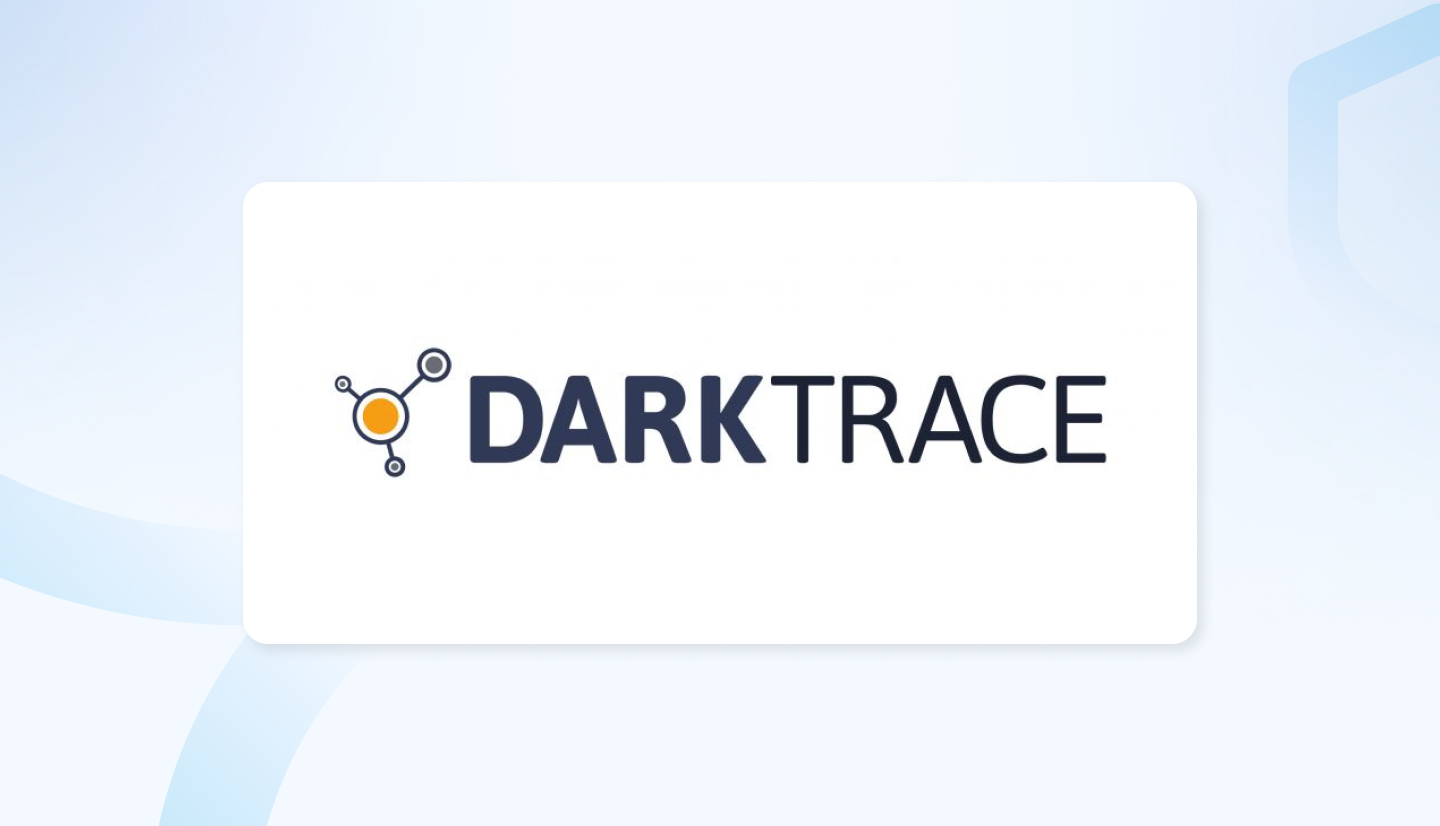
Darktrace is a cybersecurity company that leverages artificial intelligence (AI) to monitor and protect an organization’s digital assets and workforce.
One of its standout features is Darktrace Antigena, a first-response solution built to tackle active cyber threats detected by its Enterprise Immune System.
Antigena’s Autonomous Response works autonomously to neutralize threats, preventing them from spreading throughout the network.
| Features | |
| Threat Response: Machine learning detects and responds to threats in real time, such as isolating infected machines. | |
| Enterprise Immune System: AI-powered technology identifies insider threats and emerging attacks early, modeled after the human immune system. | |
| Behavioral Link Analysis: Detects malicious phishing links by revealing hidden intent within interactive web pages. | |
| Packet Capture: Full packet capture capability to grab custom PCAPs based on observed data. | |
| Deployment: It can be deployed via API or API+Journaling in Microsoft 365, or fully on the cloud or on-premise. |
Pros
- Darktrace is highly stable with no recorded downtime, ensuring reliable network protection.
- Offers comprehensive network visibility and detailed analytics for proactive threat
- Management.
- AI-powered threat detection and response operate automatically in real-time, without human intervention.
- Alerts from Darktrace are meaningful and actionable, offering clear, effective threat intelligence.
Cons
- Lacks comprehensive endpoint protection and visibility.
- Pricing is high for many users.
- Frequent false positives that require significant fine-tuning.
G2 rating: 4.4/5
8. Proofpoint
Founder: Eric Hahn
Founded: 2002
Headquarters: Sunnyvale, California, U.S
Website: proofpoint.com
Domain: Email security and data protection
Proofpoint focuses on mitigating risks that emerge from human error or failure. It delivers enterprise-grade, cloud-based solutions to defend against phishing, social engineering, and Business Email Compromise (BEC) attacks.
Since human vulnerabilities are one of the most common entry points for cybercriminals, having top-notch email security can strengthen an organization’s overall security posture. It’s a critical line of defense in preventing breaches immediately.
| Features | |
| Threat Protection: Pre-delivery sandboxing, behavioral analysis, and click-time protection. | |
| Incident Investigation: A unified console for correlating alerts, managing incidents, and threat hunting. | |
| Data Loss Prevention: Scans outgoing emails for sensitive information. | |
| Email Security: Advanced phishing detection, multilayered antivirus, and email encryption. | |
| File Monitoring: Monitors file activities such as uploads, copies, prints, downloads, and email attachments. |
Pros
- Effectively combats data loss and insider risks.
- Tackles email and cloud threats head-on.
- Helps change user behavior to enhance security.
- Intelligent compliance solutions to ensure regulatory adherence.
- Defends your remote workforce against cyber threats.
Cons
- Can be costly for smaller organizations, especially with enterprise-level features.
- Setup and configuration may be complex, requiring time and expertise.
- Can be resource-intensive, impacting system performance during heavy use.
- May require additional training for users to fully leverage its features.
G2 Rating: 4.3/5
9. Trend Micro
Founder: Eva Chen, Steve Chang, Jenny Chang
Founded: 1988
Headquarters: Los Angeles, California, U.S.
Website:trendmicro.com
Domain: AI-powered cybersecurity solutions
Trend Micro is a recognized leader in the cybersecurity space, consistently ranking as a top provider of security solutions.
Their Trend Vision One Platform uses AI-powered technology to detect and respond to threats faster, consolidate security management, and reduce costs.
In a way, it is designed to minimize the impact of security incidents by reducing alert volumes, improving response times, and significantly lowering dwell times.
| Features | |
| AI-Powered Threat Detection: Quickly detect and respond to cyber threats, reducing risk exposure. | |
| Cloud and Endpoint Protection: Ranked #1 in cloud-native application protection and endpoint security, providing comprehensive defense for both cloud environments and on-premise endpoints. | |
| Managed Detection and Response (MDR): 24/7 managed detection services to extend your security team and rapidly address threats. | |
| Protection for Hybrid and Multi-Cloud Environments: Safeguards both cloud-native applications and hybrid IT ecosystems. | |
| Risk Prioritization: Helps organizations understand, prioritize, and mitigate risk across their IT infrastructure. |
Pros
- Browser extension detects and blocks online threats while browsing.
- Has minimal impact on system performance during usage.
- Provides identity theft protection with dark web monitoring.
- Offers anti-phishing protection to help prevent cyber scams.
- Protects against malware, viruses, and ransomware, keeping devices safe from online threats.
Cons
- Can slow down performance during scanning, affecting system speed.
- Weak offline protection against malware when not connected to the internet.
- Requires individual licenses for each device you want to protect.
G2 Rating: 4.3/5
10. Okta
Founder: Todd McKinnon, Frederic Kerrest
Founded: 2009
Headquarters: San Francisco, California
Website: okta.com
Domain: Identity & access management solutions
Okta is your go-to solution for managing employee access across apps and devices. It’s an enterprise-grade identity management service designed for the cloud but also plays nicely with on-premises applications.
With Okta, your IT team can easily control who gets access to an app or a device. It runs on a secure, reliable, and heavily audited cloud platform and integrates with your existing on-premises systems, directories, and identity management tools.
| Features | |
| Single Sign-On (SSO): This enables users to sign in once and access multiple applications with the same credentials. | |
| Multifactor Authentication (MFA): Adds a second layer of security with options like one-time codes or biometrics. | |
| Mobile Identity Management: Supports integration with native iOS and Android apps, as well as mobile web applications. | |
| User Provisioning and Deprovisioning: Simplifies user account creation and removal across supported applications. | |
| Integration with Other Systems: Seamlessly integrates with Active Directory (AD), LDAP, and thousands of cloud-based apps. |
Pros
- Simplifies administration with a single console and quick application configuration.
- Streamlines onboarding and offboarding processes for users.
- Provides a secure login experience with real-time monitoring for unusual activity.
- Offers an intuitive interface and self-service password reset for ease of use.
- Seamlessly works with Microsoft products like Office 365, Windows 10, and Azure AD.
Cons
- Okta can be expensive, especially for small businesses or startups.
- Like any cloud-based service, availability depends on internet connectivity and Okta’s uptime.
- New users may face a steep learning curve during the initial setup.
- Some advanced customizations may require additional development effort.
G2 Rating: 4.5/5
11. Red Canary
Founder: Brian Beyer, Chris Rothe, Jason Garman and Keith McCammon.
Founded: 2013
Headquarters: Denver, Colorado
Website: redcanary.com
Domain: Endpoint Detection & Response
Red Canary mitigates cyber threats others miss, empowering organizations to focus on their missions without fear.
They provide managed detection and response (MDR) services, covering cloud, identity, and endpoint threats.
| Features | |
| Threat Detection: Achieves a 99+% true positive rate for highly accurate threat identification. | |
| 24/7 Security Support: Grants unlimited access to security teams around the clock. | |
| Threat Intelligence: Delivers on-demand adversary insights with opportunities for expert collaboration. | |
| Expert Response: Combines guided, automated, and human-led capabilities for effective threat management. | |
| Response Automation: Offers playbooks that seamlessly integrate with collaboration tools and security systems. | |
| Timely Notifications: Provides accurate and comprehensive alerts without delays. |
Pros
- Delivers precise and actionable notifications to keep security teams informed.
- Provides 24/7 access to world-class security experts for guidance and response.
- Streamlines responses with playbooks that integrate with existing tools and workflows.
- Monitors and responds to threats across cloud, endpoint, and identity systems.
Cons
- Initial implementation and integration with existing tools may require significant effort.
- Smaller teams may still need internal expertise to maximize the platform’s capabilities.
- Integrating with multiple tools can occasionally generate redundant or excessive alerts.
G2 Rating: 4.7/5
How to Choose Cybersecurity Companies?
It’s important to take a thoughtful approach when choosing a cybersecurity company. Assess your internal risks to determine what kind of solution you need, then choose a provider who fits those needs.
Be sure to consider the costs, scalability, and ease of use to ensure the solution works now and in the future. Here’s our advice on picking the right cybersecurity solution for your business.
1. Understand your requirements
Start by identifying your organization’s unique security challenges—do you need endpoint protection, cloud security, or compliance support?
Clarity on your priorities ensures you choose a provider that aligns with your business goals.
2. Assess expertise
Look for a company with a proven track record in your industry and experience handling similar threats. Their expertise can make a huge difference in mitigating risks effectively and quickly.
3. Evaluate technology
Ensure the provider uses advanced technologies like AI-driven detection, automation, and real-time threat monitoring. Cutting-edge tools enhance your defenses and keep you ahead of evolving threats.
4. Check certifications
Verify that the company meets recognized standards like ISO 27001, SOC 2, or GDPR compliance. These certifications indicate they assess their commitment to data/information security.
5. Scalability
Choose a partner who can scale its services as your business grows or your security needs evolve. A scalable solution will prevent you from switching providers later.
The all-in-one solution to manage risks and compliance
Now that you better understand the top players in cybersecurity let’s discuss a critical component of security that adds resilience to your posture- risk management and compliance.
As security and incident management tools become more sophisticated, malicious actors are creating creative ways to circumvent these.
The way out of this is to implement robust controls across the ecosystem and continuously assess their performance.
This is where security compliance platforms like Sprinto help. They continuously test, track, and tackle security gaps and manage control vulnerabilities. You can check the health of your controls in real-time from a centralized dashboard based on their performance—passing, failing, critical, and due against any information security compliance framework.
Sprinto automatically links risks to compliance standards and controls and conducts automated assessments to validate and monitor their status. Once it detects irregularities, the system prompts alerts and directs remediation processes to appropriate risk owners.
Time-sensitive and detailed alerts facilitate quick resolution of issues, enabling you to mitigate risks throughout their lifecycle. Talk to our experts now.
FAQs
Which are the top cybersecurity companies for small to medium SaaS businesses?
The top companies that offer managed security services for small to medium-cloud platforms are Sprinto, CrowdStrike, and Okta. These cybersecurity firms offer a wide range of capabilities to protect cloud assets.
What are the main areas of cyber security?
The main areas of cyber security are multi-factor authentication management, endpoint detection, attack simulations, mobile security, and application firewalls.
What are cyber security service companies?
Cyber security service companies offer managed services, tools, and expertise to help organizations identify, mitigate, and investigate a wide range of cyber threats.


Use Sprinto to centralize security compliance management – so nothing
gets in the way of your moving up and winning big.








